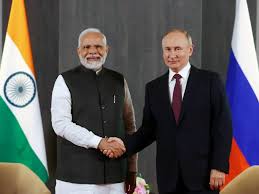
Putin to Visit India in December, Confirms Kremlin Aide

 :
| Updated On: 30-Aug-2025 @ 3:17 pm
:
| Updated On: 30-Aug-2025 @ 3:17 pmSHARE
Russian President Vladimir Putin is set to travel to India in December 2025 for the annual bilateral summit, Kremlin foreign policy aide Yuri Ushakov announced on Friday. This high-level visit will mark a significant milestone in India-Russia relations, particularly as both nations celebrate the 15th anniversary of their “special strategic partnership,” a framework formally adopted in December 2010. Ushakov emphasized the enduring strength of this partnership, highlighting its role in shaping bilateral cooperation across economic, defense, energy, and geopolitical domains.
Before the December summit, President Putin and Indian Prime Minister Narendra Modi will hold talks in Tianjin, China, on the sidelines of the Shanghai Cooperation Organisation (SCO) Summit. The meeting is scheduled for Monday, immediately following the SCO Plus gathering on September 1. According to Ushakov, the two leaders will use the opportunity to discuss preparations for Putin’s upcoming India visit. This will be their first in-person interaction in 2025, although they have remained in regular contact through phone conversations. The meeting in Tianjin carries particular weight as it comes amid shifting global geopolitical alignments, regional tensions, and economic uncertainties.
Ushakov noted that discussions in Tianjin will not only focus on the logistics of the December summit but also provide a platform for Modi and Putin to review the state of bilateral ties and identify areas for deeper collaboration. Their dialogue is expected to cover key issues such as defense cooperation, trade, energy security, and global strategic affairs. India and Russia have long shared close relations, underpinned by mutual trust and a history of cooperation in areas such as defense procurement, nuclear energy, space exploration, and hydrocarbons. The December summit is likely to reaffirm these ties and outline future directions of cooperation.
Prime Minister Modi had already visited Russia twice in 2024. His first visit was for the annual bilateral summit with Putin, and his second was to participate in the BRICS Summit held in Kazan. These visits reflected India’s commitment to maintaining strong relations with Russia, even as global geopolitical dynamics shift. Putin’s upcoming India visit continues this pattern of high-level engagement and underscores the significance of India-Russia relations in the current international landscape.
Meanwhile, the broader context of India’s foreign relations adds another layer of complexity to the developments. Relations between New Delhi and Washington have faced strains, particularly over trade and energy issues. US President Donald Trump recently announced a doubling of tariffs on Indian goods, raising them to 50 percent. Additionally, Trump imposed an extra 25 percent duty specifically targeting India’s purchase of Russian crude oil. These measures reflect Washington’s growing concerns over India’s continued engagement with Russia, especially in the energy sector.
India, however, has maintained that its energy procurement decisions are guided by national interests and market dynamics rather than external pressures. For New Delhi, diversifying energy imports, including sourcing affordable Russian oil, is crucial to sustaining economic growth and ensuring energy security. This stance underscores India’s effort to balance its relations with both Russia and the United States, even as it faces increasing scrutiny and economic challenges due to Washington’s protectionist measures.
In sum, Putin’s December visit to India is set against a backdrop of significant geopolitical and economic developments. The 15th anniversary of the India-Russia special strategic partnership provides a symbolic and substantive opportunity for both countries to reaffirm their long-standing ties. Modi and Putin’s meeting in Tianjin will help set the agenda for the December summit, addressing issues ranging from defense and energy to global stability and multipolarity. At the same time, India’s strained ties with the US over tariffs and Russian oil purchases highlight the challenges New Delhi faces in navigating an increasingly complex international order. Putin’s India trip thus carries not only bilateral importance but also wider regional and global implications.